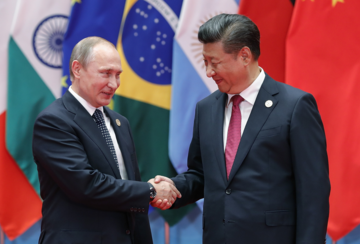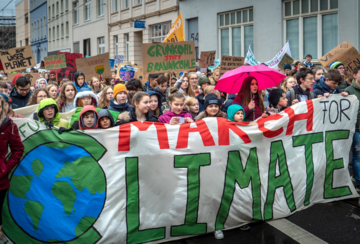News

During her summer internship with the Asia Policy Institute, Chaeri Park (Master's in International Policy '22) focused on how nations in Southeast Asia are working bilaterally, regionally, and globally to tackle problems around cybersecurity.

In this Q&A, Stanford scholar Thomas Fingar discusses what to expect when President Biden meets with Chinese President Xi Jinping.
This is the fourth of a series of pieces we have published on societies and elections at risk from online disinformation. The politically-fueled disinformation engine in Brazil puts the country in the midst of an information crisis leading up to its 2022 presidential election.
The Program on Arab Reform and Democracy (ARD) at CDDRL hosted a talk featuring Mona El-Ghobashy, Clinical Assistant Professor of Liberal Studies at New York University, who discussed her latest book – Bread and Freedom: Egypt’s Revolutionary Situation (Stanford University Press 2021).
Oriana Skylar Mastro has built two careers simultaneously: one as an academic, the other, as a service member in the U.S. Air Force.
America's Future in Taiwan
Intensifying threats of a military conflict over Taiwan have brought uncertainty to the stability of regional security for Southeast Asia, according to Center Fellow Oriana Skylar Mastro on radio show On Point.
A message from REDI Task Force Chair, Beatriz Magaloni

The SPICE/Stanford–CASEER/UTokyo Lecture Series provides a platform to share current educational research and practice.
Each year, the Global Affiliates Program hosts at APARC a cohort of qualified personnel nominated by our affiliate members, who send their talent to Stanford as visiting fellows for a year of research and enrichment.
Faculty members in Stanford’s political science department, and members of the department’s Diversity, Equity, and Inclusion Committee (DEI), offer their perspective on the recent attacks on their colleague Hakeem Jefferson.

Empirical evidence by Karen Eggleston and colleagues suggests that better primary health care management of chronic disease in rural China can reduce spending while contributing to better health.

National security analyst and veteran podcaster Ben Rhodes joins Michael McFaul on World Class to discuss his new book, After the Fall: Being American in the World We've Made, and the reasons nationalism and authoritarianism are on the rise across the globe.
The nation spends billions of dollars on cybersecurity measures, and yet we seem unable to get ahead of this problem. Why are our computers so hard to protect? An experience with a house cat provided insights.

Authors Ryan Hass and Jude Blanchette highlight Scott Rozelle's research on the human capital criss in rural China.

Together For Our Planet: Americans are More Aligned on Taking Action on Climate Change than Expected
New data from the Center for Deliberative Democracy suggests that when given the opportunity to discuss climate change in a substantive way, the majority of Americans are open to taking proactive measures to address the global climate crisis.

SPICE and Stanford Global Studies will offer a free virtual workshop with Professor Tomás Jiménez on November 9, 4:00–6:00PM.
Panelists for the Department of Health Policy's inaugural Health Equity Panel discuss the health disparities exacerbated by the COVID-19 pandemic, as well as families and health and consequences from lack of gender equity, and the impact of Medicaid on access to care, insurance coverage, racial disparities and maternal and infant health. Panel video is embedded in this story.

The Program on Arab Reform and Democracy (ARD) at CDDRL hosted a panel featuring Tunisian activists, who examined the threat of authoritarian resurgence in the country after the power grab executed by President Kais Saied on July 25, 2021.
A Lead Author of the IPCC Sixth Assessment Report, Paul N. Edwards, talks about knowledge infrastructures and geoengineering, as well as policy and visual aspects of the landmark report on climate change.
SCCEI welcomed six postdoctoral scholars to the team this year. We spoke with each of them to learn more about them and their research interests.

A Nature survey reveals that many authors of the latest IPCC climate-science report--including Paul N. Edwards--are anxious about the future and expect to see catastrophic changes in their lifetimes.
Black Shadow & the Future of Cyberwarfare
The Jerusalem Press Club speaks to cybersecurity expert Dr. Gil Baram about the impact and significance of the Iranian-affiliated hackers' maneuver against a number of Israeli companies on Saturday.

APARC's new edited volume, 'The North Korean Conundrum,' shines a spotlight on the North Korean human rights crisis and its connection to nuclear security. In the book launch discussion, contributors to the volume explain why improving human rights in the country ought to play an integral part of any comprehensive U.S. engagement strategy with the DPRK.




![[Left to right]: Michael McFaul, Marshall Burke, Steven Pifer, Oriana Skylar Mastro, Didi Kuo, and Amichai Magen on stage.](https://fsi9-prod.s3.us-west-1.amazonaws.com/s3fs-public/styles/480x270/public/2024-10/fsi_reunion_2024_panel_hero.png?h=c4d9845d&itok=s9RgEIqP)










